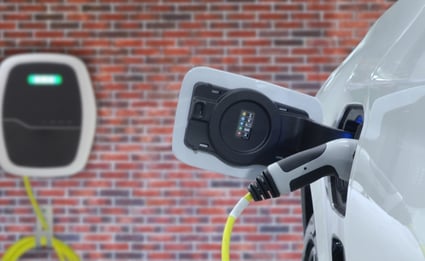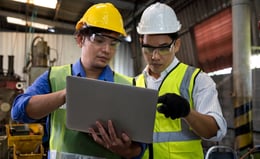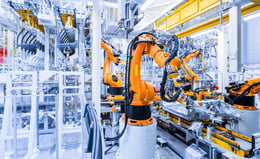EV Battery Sourcing and Sustainability
Martin Pahulje - June 08, 2021

Sustainability is an increasingly pressing issue. With the world in a climate crisis, it is of growing importance for companies to transition to more sustainable business practices. In the automotive industry, this crisis has skyrocketed the development of electric vehicles (EV). In 2017, 3 million electric cars were sold, and this number has not stopped growing. It is expected that sales will increase to a startling 23 million by 2023, according to the International Energy Agency. Unsurprisingly, similar growth is expected for the rechargeable batteries used for these cars.
Designed to reduce carbon footprints and the use of fossil fuels, EVs are an excellent step in the direction of a more sustainable economy. But, while this is an innovative and instrumental use of environmentally-friendly resources, materials are still scarce, and the components necessary for EVs are difficult and problematic to come by. In attempting to solve one crisis, we have created another. While on paper, the use of electric vehicles may be a sustainable solution, the means of producing these batteries come with environmental detriments of their own.
Currently, the EV industry is facing a shortage of batteries due to the difficulty of procuring scarce materials. To satisfy the growing demand for electric vehicles, the EV industry will need to obtain a significant amount of lithium-ion batteries. In order to procure such an amount, new sources and technologies will be required to find, extract, and process the battery materials, which comes with implications of its own. As a result, supply chains will have to scale up operations significantly, creating an industry capable of supply the consumer electronics industry to supply the transportation industry. Fortunately, through machine learning, a more sustainable method of extracting these vital materials may be found.
Sourcing
The sourcing of EV battery materials such as lithium, cobalt, and nickel currently involves extracting the materials from beneath the earth through mining. While rechargeable batteries seem to be a more sustainable solution than the components of traditional vehicles, they face environmental and social issues of their own. The extraction process has proven to be problematic for a variety of reasons. For cobalt, two-thirds of the world’s supply is located in one of the world’s most impoverished countries, Congo. To make matters worse, the mining process is a grueling one and often involves child labor. Because cobalt is a vital material needed for the production of rechargeable batteries, it does not seem as though these efforts can stop as demand for electric cars has pushed the global demand for cobalt through the roof. Fortunately, major tech companies have started the attempt to access cobalt more humanely. In addition to humanitarian conflicts, the materials necessary for EV batteries also pose an environmental issue. Lithium, another vital material, is extracted from evaporation ponds. Primarily located in the Tibetan river, lithium mines are causing significant environmental problems due to toxic chemical leaks. Not only is this chemical contaminating a major water source, but it is harming animals in the process, resulting in protests. Like cobalt, lithium's demand has increased significantly due to the growing demand for renewable batteries.
Electric vehicles were designed as a solution to our worsening climate crisis, intended to reduce our reliance on fossil fuels and minimize carbon emissions. While that is still the case, sourcing the materials required for these batteries has proven to create catastrophic damage to the environments they are sourced from. Fortunately, experts are looking to solve this rising issue. Battery giants, tech startups, EV makers, and policymakers alike are looking for ways to find new and sustainable sources for sustainable batteries.
Sustainability through Machine Learning
One of the ways this research is being done is through machine learning. Through ML, researchers can test methods of battery mineral exploration without performing the physical exploration, reducing more harm to the already damaged environment. Through this process, there is hope that alternative materials can be found to replace scarce and inaccessible materials such as cobalt, lithium, and nickel. Once this is achieved, batteries can be optimized to be more recyclable, creating a robust circular battery economy. This style of economy promotes the reuse and recycling of batteries, minimizing the need to procure new materials – which is an expensive and harmful process.
Machine learning uses a database of information, in this case, about the earth's crust and uses algorithms to mine that data and make predictions about underground materials around the world. These predictions can then be used to explore new areas for extraction. In this case, machine learning can use historical data about past mining locations, combined with information about the earth’s underground resources to determine other potential variant-rich areas. For example, KoBold Metals is currently investigating the possibility of cobalt mining in Quebec, Canada, as an alternative to the Congo. While materials would still need to be extracted and procured for the production of EV batteries, the ability to extract from more than one location can alleviate the damage done to a singular environment.
Other organizations are developing more efficient processes of extracting lithium from underground and using scrap metal from EV battery production to use for raw materials. While these developments do not eliminate the use of scarce materials, it is a step in the right direction. Still, battery manufacturers are looking for alternatives to these materials, such as cobalt in particular. There are predictions that next-generation cobalt-free lithium batteries will be available in a few years. Similarly, other automotive makers are looking to minimize the amount of cobalt in their batteries if not pledging to use cobalt-free batteries altogether.
Eliminating harmful and scarce materials is just one EV battery issue. Currently, there is a shortage of EV batteries themselves and the materials needed to produce them. Efforts are being made to acquire these materials through different means, and supply chains are racing to scale operations to handle the production of these batteries. Even so, in the near future, energy companies, auto manufacturers, and battery makers will need to create an entirely new framework to source, extract, and process battery materials sustainability for electric vehicles to have a future. In addition to this, old EV batteries will need a system to reuse and recycle them. This process will be an expensive and complex one, but it is necessary for the future of our economy and ecosystem. Circular and sustainable EV batteries, and the systems required to support them, are the future of the electric revolution. For this future to be possible, we must work now towards becoming more sustainable.
If you want to learn more, download your guide to Transformation of Manufacturing Processes.
In this Guide you will learn:
-
Emerging Challenges in the Modern Truck/Automotive Industry
-
How Can Global Companies Adapt to These New Realities
-
How Decentralized Digital Systems Power Smarter Planning Processes
-
How flexis Can Support Flexible Supply Chain Transformation
LATEST POSTS
- Understand Circular Economy in The Manufacturing Industry
- How Can Industry 4.0 IT Integration Be Achieved Smoothly?
- The Significance of Order Sequencing in Discrete Manufacturing
- How to improve your Supply Chain Management: The Power of Control Towers
- Optimizing Human Resource Scheduling in Manufacturing: A Technological Approach



